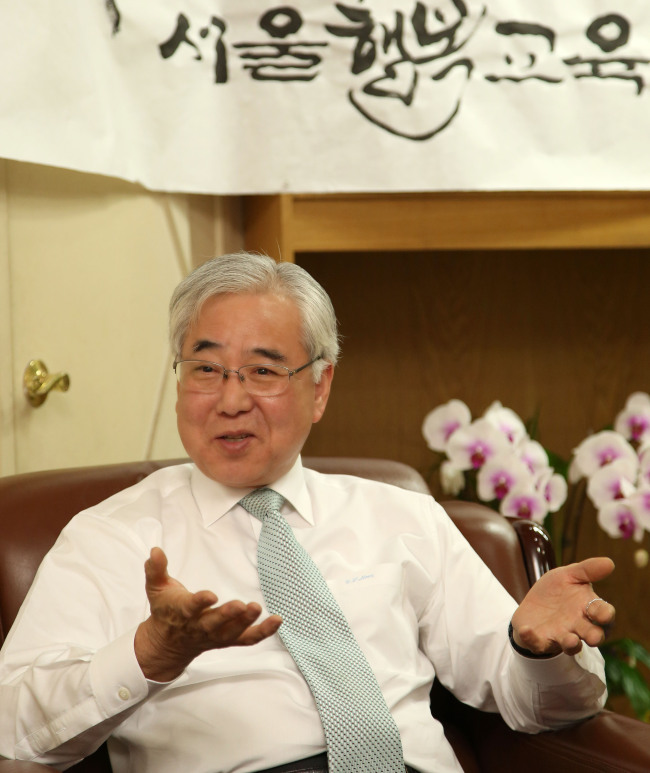Incumbent Seoul education superintendent Moon Yong-rin vowed to reform the the traditional emphasis on rote memorization, which stifles creative thinking, if he is reelected as the capital’s education chief in the upcoming June 4 local elections.
“My dream is to educate the students in a way that encourages their dreams and talents, but one year and four months in office was too short to realize it,” the 66-year-old former professor said, explaining that his key policy of “happy education” centers helped students find what they want to do and pursue a career in the field.
In this effort, Moon vowed to work in tandem with the government-led “free-learning semester,” an experimental no-test semester that provides various job-related experiences for first-year middle school students. Moon vowed to expand the existing system if he returned to office.
Moon also left the door open for state-authored history textbooks. Last year, controversy over the supposedly inaccurate content of a state-authorized history textbook swept the country. It prompted debate about possibly reinstating the state textbook system that started in 1974 during the 16-year rule of Park Chung-hee and abolished in 2002.
 |
Moon Yong-rin |
“The primary condition for correct historical education is that we (the educators) should be able to share a common perception of history. Conservatives and liberals each writing their own viewpoints of history is basically just using education for their political purposes,” he said. “I think we can consider reinstating the textbook.”
During the course of the campaigning, Moon was severely criticized by his conservative rival Koh Seung-duk, who said Moon and his inner circle are monopolizing all the top positions and benefits at the Seoul Metropolitan Office of Education.
Koh accused Moon of favoring people who graduated from the same alma mater, Seoul National University, with a degree in education. He called them “kyofia” ― a combination of the Korean word “kyo-yuk (education)” and “mafia.”
“The people working in the education circles are experts in those fields, which means it is only natural that there are many education majors in office,” he said.
But Moon admitted that he tended to favor alumni from the same school.
“What field does not have such a tendency (to favor alumni)? But the real question is: Did such a custom prompt such a hazard?” he said. “If there was anything I did wrong as ‘kyofia,’ feel free to point it out. Don’t just say ‘Oh, there are many people who graduated from the same school in the same workplace.’”
In a possible response to the criticism about the supposed favoritism, Moon proposed a policy on Tuesday that would allow some high-school graduates a chance to become school teachers. The law currently allows only college graduates who majored in education and those who studied specific education subjects to apply for the state-run teacher certification test. His new policy would allow top-ranked applicants from the World Skills Competition and National Skills Competition, an engineering event, to be hired as teachers.
Moon also emphasized the importance of safety-related education, which became a hot-button issue in the light of the tragic sinking of the ferry Sewol.
“The biggest reason behind the reoccurring accidents is because our education system fails to teach children how much safety matters. As a result we become adults before we realize the importance of safety,” he said.
Moon pledged to introduce customized safety education that starts when a child is a preschooler and ends when he or she graduates from high school.
Moon was critical of a series of policies introduced by left-leaning former education chief Kwak No-hyun, namely the “innovative school” program, which designates a select few schools to pursue new ways of learning.
He also bashed Seoul’s free lunch program, which he said was the main reason why the education office had been unable to fix the old and battered school buildings across the city.
“The (free lunch) program sucked up the education-related budget like a black hole, and almost put a full stop to investigating school facilities, which is directly linked to school safety,” he said.
Moon claimed Kwak and Cho Hi-yeon, the liberal candidate for Seoul education chief, have blindly followed policies that have been pursued by the left-leaning Korean Teachers and Education Workers Union, the largest group of teachers in the country.
“In my mind, the biggest damages in the education today have been inflicted by the KTU. They (liberals) are saying they’ll introduce the innovative schools, but they don’t even know what the schools’ strong points are,” he said, adding that he would “fight” what he claims to be KTU-led policies.
“Koh doesn’t know education, which means he doesn’t know what the KTU might do. I’m the best man for the job.”
A former professor of education at Seoul National University, Moon’s resume includes a stint as minister of education during the Kim Dae-jung administration, from January to July 2000. In 2012, he was elected as the education chief of Seoul, succeeding Kwak No-hyun, who stepped down amid bribery allegations.
By Yoon Min-sik (
minsikyoon@heraldcorp.com)








